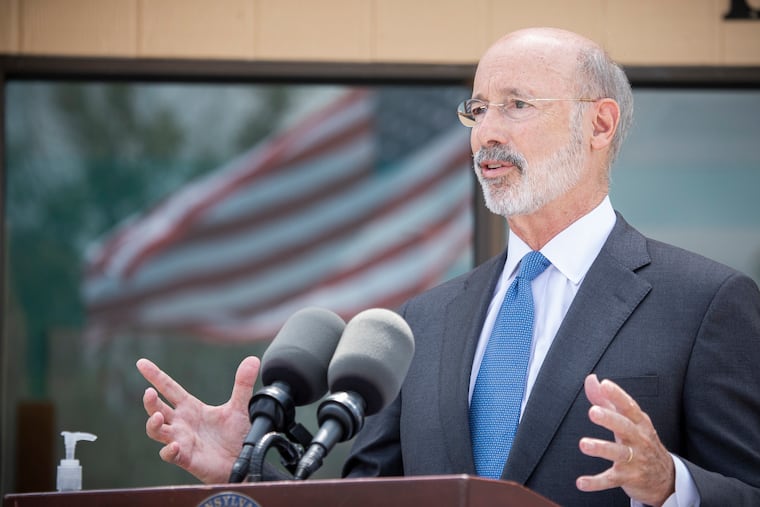Gov. Tom Wolf wants Pa. to legalize marijuana, provide more COVID-19 relief this fall
Pennsylvania is still sitting on $1 billion provided through the federal CARES Act, as legislative leaders wait to see if Congress will pass another relief bill.

Spotlight PA is an independent, nonpartisan newsroom powered by The Philadelphia Inquirer in partnership with PennLive/The Patriot-News, TribLIVE/Pittsburgh Tribune-Review, and WITF Public Media. Sign up for our free weekly newsletter.
HARRISBURG — Gov. Tom Wolf wants state lawmakers to legalize recreational cannabis this fall and spend $1 billion in federal funds to expand access to child care and provide more COVID-19 relief to small businesses and others affected by the pandemic.
The governor on Tuesday also called on the Republican-controlled legislature to pass a limit on campaign donations.
Pennsylvania is facing a massive budget shortfall after months of business shutdowns and stay-at-home orders, with the state expected to lose $5 billion in revenue through next June. To buy time, the General Assembly passed a stopgap budget this spring, along with a $2.6 billion package that used federal dollars to assist struggling nursing homes, people facing eviction, and business owners.
Pennsylvania is still sitting on $1 billion provided through the federal CARES Act, as legislative leaders wait to see if Congress will pass another relief bill or give states more flexibility to spend the dollars on lost tax revenue. Lawmakers are expected to face bleak decisions when they return to finish the budget.
At a media event Tuesday, Wolf called for “common-sense reforms” that he said should focus on supporting families, workers, and businesses. That includes policy changes like expanding paid parental leave to all workers.
“House and Senate Democrats have been fighting for these things for years, and certainly since the beginning of the pandemic,” Wolf said. “They’ve been stopped at every turn by the Republicans who’ve been focused on ignoring the public health crisis and actually trashing me. That has to stop. We’ve got to get back to doing things that actually matter to people.”
Wolf and GOP leaders have repeatedly found themselves at odds over the administration’s response to the pandemic, including the temporary closure of businesses statewide and current restrictions on restaurants, salons, and entertainment venues. That tension has led to a few court battles, including one over a resolution to force Wolf to end the state’s disaster declaration. The state Supreme Court ultimately sided with Wolf, though Republicans are still seeking to undermine the governor’s emergency powers.
On Tuesday, Wolf called on lawmakers to use the remaining $1 billion in federal money to help businesses purchase personal protective equipment, boost pay for frontline workers, fund education options for students of all ages, and provide relief to families unable to pay utility bills or rent.
Wolf said he hopes an additional $90 million could be generated by revenue from legalized recreational marijuana to further fund pandemic-related relief efforts for small businesses. After years of saying Pennsylvania was not ready for recreational cannabis, the governor backed legalization for the first time in September 2019.
The governor’s remarks came at a time when the growth of the state’s medical marijuana program has been explosive.
Since February, dispensaries have sold almost as much marijuana as they had during the previous two years combined — $385 million in legal sales vs. $400 million for the two years before, state figures show. Industry analysts say that, even without legalization of recreational marijuana, sales of medical could hit $1 billion within three or four years.
The number of patient visits has skyrocketed too, hitting 120,000 weekly this month compared with a figure of about half that six months ago.
Experts think the boom may be related to COVID-19 as some residents seek assistance from the drug to quell anxiety. Pennsylvania has also taken steps to remove a sales barrier permitting doctors to prescribe marijuana via telemedicine and letting dispensaries provide curb pickup to limit potential coronavirus exposure.
Wolf coupled his proposals with calls for long-stalled government accountability reforms like further checks on gifts to elected officials and a limit on campaign donations.
“We’re the Wild West in Pennsylvania,” he said. “We need to actually rein that in.”
Republicans in the Capitol, who are expected to return to Harrisburg in the coming weeks, said they are not on board with the governor’s plan and have previously opposed calls for legalization of recreational marijuana.
House Majority Leader Kerry Benninghoff (R., Centre) called the governor’s pitch “unaffordable” and blamed the administration’s “unilateral mandates” for causing economic harm. Senate Majority Leader Jake Corman called the plan a “press release” and claimed Wolf has not “held a call with legislative leaders since July.”
“Instead, he sends out a political document and takes partisan shots at elected officials,” Corman said.
100% ESSENTIAL: Spotlight PA relies on funding from foundations and readers like you who are committed to accountability journalism that gets results. If you value this reporting, please give a gift today at spotlightpa.org/donate.